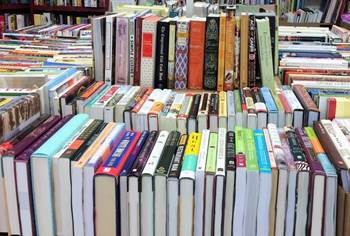
Book

Kiwis buy almost five million books each year and this figure continues to rise, according to this 2018 NZ Herald article, which is updated by this information in a 2020 Caxton Educational article.
This Anthropocene Magazine article debates the merits of eReaders and Books.
Read more about the real environmental impact of buying a new book here.
Save a tree! Join the Whanganui District Library, Gonville Library and library hubs (in Whanganui East, Castlecliff and Aramoho) and the mobile library to borrow books. There is a catalogue online and books can be reserved.
Share and swap books with family, friends and neighbours. Consider setting up a local street library.
Secondhand and charity shops are also great sources of pre-loved books.
Purchase the electronic or e-book version instead. Gift e-book vouchers to friends and family.
There are many pre-loved books available from charity and secondhand shops in town. There are also bookfairs run periodically as fund-raisers for local groups who do great community work (e.g. St John's Ambulance and Rotary).
Make book-art, bunting, decorations, gift-tags. Re-use bookcovers for notebooks. Books can be reused for many creative artworks, see more in this article.
Recycle good books among family, friends and neighbours. Drop books into secondhand shops or gift to fundraising bookfairs.
Books can be placed in the mixed paper cage at the Whanganui Resource Recovery Centre.
As paper can be recycled, this is the best solution. Paper can be composted, but bookcovers may require cutting/shredding.